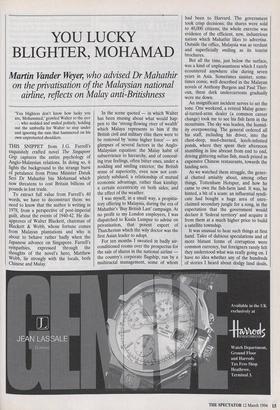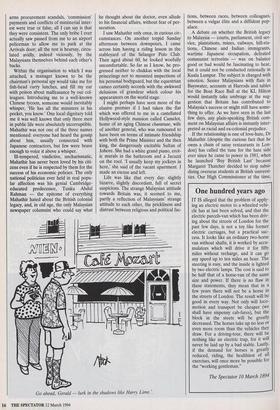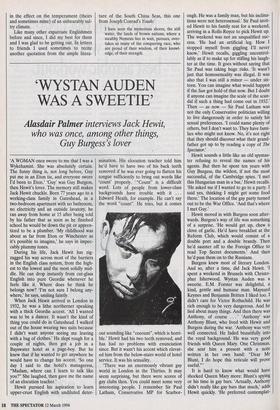YOU LUCKY BLIGHTER, MOHAMAD
Martin Vander Weyer, who advised Dr Mahathir
on the privatisation of the Malaysian national airline, reflects on Malay anti-Britishness
'You blighters don't know how lucky you are, Mohammed,' growled Walter to the syce . . . who nodded and smiled politely, holding out the umbrella for Walter to step under and ignoring the rain that hammered on his own unprotected shoulders.
THIS SNIPPET from J. G. Farrell's exquisitely crafted novel The Singapore Grip captures the entire psychology of Anglo-Malaysian relations. In doing so, it lights the background to the strange burst of petulance from Prime Minister Datuk Seri Dr Mahathir bin Mohamad which now threatens to cost Britain billions of pounds in lost trade.
To extract full value from Farrell's 40 words, we have to deconstruct them: we need to know that the author is writing in 1978, from a perspective of post-imperial guilt, about the events of 1940-42. He dis- approves of Walter Blackett, chairman of Blackett & Webb, whose fortune comes from Malayan plantations and who is about to behave rather badly when the Japanese advance on Singapore. Farrell's sympathies, expressed through the thoughts of the novel's hero, Matthew Webb, lie strongly with the locals, both Chinese and Malay. In the scene quoted — in which Walter has been musing about what would hap- pen to the 'strong-flowing river of wealth' which Malaya represents to him if the British civil and military elite there were to be removed by 'some higher force' — are glimpses of several factors in the Anglo- Malaysian equation: the Malay habit of subservience to hierarchy, and of conceal- ing true feelings, often bitter ones, under a nodding and smiling exterior; the British sense of superiority, even now not com- pletely subdued; a relationship of mutual economic advantage, rather than kinship; a certain eccentricity on both sides; and the effect of the weather.
I was myself, in a small way, a propitia- tory offering to Malaysia, during the era of Mahathir's 'Buy British Last' campaign. At no profit to my London employers, I was dispatched to Kuala Lumpur to advise on privatisation, that potent export of Thatcherism which the wily doctor was the first Asian leader to adopt.
For ten months I sweated in badly air- conditioned rooms over the prospectus for the sale of shares in the national airline the country's corporate flagship, run by a multiracial management, some of whom had been to Harvard. The government took crisp decisions; the shares were sold to 40,000 citizens; the whole exercise was evidence of the efficient, new, industrious nation which Mahathir likes to advertise. Outside the office, Malaysia was as verdant and superficially smiling as its tourist brochures.
But all the time, just below the surface, was a kind of unpleasantness which I rarely ecountered anywhere else during seven years in Asia. Sometimes sinister, some- times comic, well described in the Malayan novels of Anthony Burgess and Paul Ther- oux, these dark undercurrents gradually wore me down.
An insignificant incident serves to set the tone. One weekend, a retired Malay gener- al-turned-arms dealer (a common career change) took me to see his fish farm in the mountains. The sky was leaden, the humid- ity overpowering. The general ordered all his staff, including his driver, into the chest-deep, mud-churned, leech-infested ponds, where they spent their afternoon stumbling in line abreast from end to end, driving glittering sultan fish, much prized in expensive Chinese restaurants, towards the landing nets.
As we watched them struggle, the gener- al chatted amiably about, among other things, Tottenham Hotspur, and how he came to own the fish-farm land. It was, he hinted, a bit of a scam: an influential syndi- cate had bought a huge area of unre- claimed secondary jungle for a song, in the expectation that the government would declare it 'federal territory' and acquire it from them at a much higher price to build a satellite township.
It was unusual to hear such things at first hand. Tales of dubious speculations and of more blatant forms of corruption were common currency, but foreigners rarely felt they understood what was really going on. I have no idea whether any of the hundreds of stories I heard about dodgy land deals, arms procurement scandals, 'commission' payments and conflicts of ministerial inter- est were true or false; all I can say is that they were consistent. The only bribe I ever actually saw passed from me to an airport policeman to allow me to park at the Arrivals door; all the rest is hearsay, circu- lated avidly, indeed viciously, by the Malaysians themselves behind each other's backs.
Within the organisation to which I was attached, a manager known to be the chairman's personal spy would take me for fish-head curry lunches, and fill my ear with poison about malfeasance by our col- leagues. Introducing me to a well-known Chinese tycoon, someone would inevitably whisper, 'He has all the ministers in his pocket, you know.' One local dignitary told me it was well known that only three men in public life were absolutely incorruptible. Mahathir was not one of the three names mentioned: everyone had heard the gossip about him, usually connected with Japanese contractors, but few were brave enough to voice it above a whisper.
Ill-tempered, vindictive, uncharismatic, Mahathir has never been loved by his citi- zens even if he is respected by them for the success of his economic policies. The only national politician ever held in real popu- lar affection was his genial Cambridge- educated predecessor, Tunku Abdul Rahman — the epitome of everything Mahathir hated about the British colonial legacy, and, in old age, the only Malaysian newspaper columnist who could say what he thought about the doctor, even allude to his financial affairs, without fear of per- secution.
I saw Mahathir only once, in curious cir- cumstances. On another torpid Sunday afternoon between downpours, I came across him having a riding lesson in the stableyard of the Selangor Polo Club. Then aged about 60, he looked woefully uncomfortable. So far as I know, he pro- gressed neither to chukkas with the local princelings nor to mounted inspections of his personal bodyguard, but the equestrian cameo certainly accords with the awkward delusions of grandeur which colour his appearances on the world stage.
I might perhaps have seen more of the elusive premier if I had taken the flat which was offered to me in a castellated Hollywood-style mansion called Camelot, home of an aging Chinese chanteuse, wife of another general, who was rumoured to have been on terms of intimate friendship with both the Prime Minister and the then king, the dangerously excitable Sultan of Johore. She had a white grand piano, erot- ic murals in the bathroom and a Jacuzzi on the roof. 'I usually keep my jockeys in here,' she said of the vacant apartment. I made an excuse and left.
Life was like that every day: slightly bizarre, slightly discordant, full of secret suspicions. The strange Malaysian attitude towards Britain was, it seemed to me, partly a reflection of Malaysians' strange attitude to each other, the prickliness and distrust between religious and political fac- Go ahead, Gerald — lurk in the shadows like Harry Lime: , tions, between races, between colleagues, between a vulgar elite and a diffident pop- ulace.
A debate on whether the British legacy to Malaysia — courts, parliament, civil ser- vice, plantations, mines, railways, hill-sta- tions, Chinese and Indian immigrants, wartime Japanese occupation, defeated communist terrorists — was on balance good or bad would be fascinating to hear, but it could not be conducted rationally in Kuala Lumpur. The subject is charged with emotion. Senior Malaysians with flats in Bayswater, accounts at Harrods and tables for the Boat Race Ball at the KL Hilton would instantly take umbrage at the sug- gestion that Britain has contributed to Malaysia's success or might still have some- thing to offer. As we have seen in the last few days, any plain-speaking British com- ment on Malaysian affairs is instantly inter- preted as racial and ex-colonial prejudice.
If the relationship is one of love-hate, Dr Mahathir (despite the curious fact that he owns a chain of satay restaurants in Lon- don) has called the tune for the hate side ever since he came to power in 1981, when he launched 'Buy British Last' because Margaret Thatcher decided to stop subsi- dising overseas students at British universi- ties. Our High Commissioner at the time, William Bentley, made the mistake of reminding local journalists (off the record) that British blood had been spilled during the 1948-60 Emergency to keep Malaysia from communism. For this he was publicly vilified by the new premier, and cold- shouldered for the rest of his term.
The ordinary cut-and-thrust of com- merce became fertile ground for anti- British fire-stoking. When a Malaysian institution bought the plantation company Guthrie in a dawn raid on the London Stock Exchange, the subsequent rule- change to prevent such sudden-death takeovers was interpreted as an insult to Malaysia. The denial of additional landing slots at Heathrow for the Malaysian airline was treated, repeatedly, as a major diplo- matic slight — on which we eventually gave way every time, and will probably do so again to defuse the current row. In my own modest assignment, exposition of the subtleties of privatisation had to be pre- sented with extreme caution at all times, lest I should suggest in the tiniest degree that what we did in London was ethically or intellectually superior to the practices of the rackety local capital markets. Towards the end of my time in Kuala Lumpur I found I was counting the remaining days in my diary. Some locals had been kind and helpful, many had not. Some displayed, in irrational patterns, both polarities of the love-hate problem. I remember particularly the brilliant, volatile Malay surgeon-turned-banker (once a colleague of Mahathir, the doctor- turned-statesman) who was capable of fierce bursts of anti-British resentment, but treated me personally like a son. These unprompted flashes of hostility were rooted, it seemed to me, not only in the history of British involvement there, but in the suppressed tensions of the soci- ety the Malaysians have created for them- selves — and, trivial though it may seem, `Portions of Scene IV, Act II, deal with material not suitable for family viewing.' in the effect on the temperament (theirs and sometimes mine) of an unbearably sul- try climate.
Like many other expatriate Englishmen before and since, I did my best for them and I was glad to be getting out. In letters to friends I used sometimes to recite another quotation from the ample litera- ture of the South China Seas, this one from Joseph Conrad's Youth: I have seen the mysterious shores, the still water, the lands of brown nations, where a stealthy Nemesis lies in wait, pursues, over- takes so many of the conquering race, who are proud of their wisdom, of their knowl- edge, of their strength.





















































 Previous page
Previous page